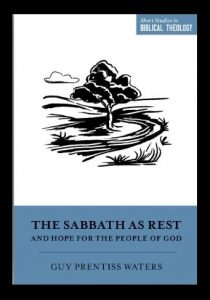 How do we think of the Sabbath in a world of continuous connections to people, places, and things via digital devices? Marketers are proud of their twenty-four hours per day, seven days a week ability to deliver products, services, and personnel for just about anything one could desire. However, as Guy Prentiss Waters shows in The Sabbath as Rest and Hope for the People of God, 2022, the unbroken seven days a week way of life is contrary to the Sabbath as a creation ordinance and a pattern for weekly worship. His 156-page volume is in the series Short Studies in Biblical Theology issued by Crossway for which he previously wrote The Lord’s Supper as the Sign and Meal of the New Covenant, 2019. Dr. Waters is academic dean and professor of New Testament at Reformed Theological Seminary in Jackson, Mississippi, and he has written or edited fifteen books as well as numerous entries for serials.
How do we think of the Sabbath in a world of continuous connections to people, places, and things via digital devices? Marketers are proud of their twenty-four hours per day, seven days a week ability to deliver products, services, and personnel for just about anything one could desire. However, as Guy Prentiss Waters shows in The Sabbath as Rest and Hope for the People of God, 2022, the unbroken seven days a week way of life is contrary to the Sabbath as a creation ordinance and a pattern for weekly worship. His 156-page volume is in the series Short Studies in Biblical Theology issued by Crossway for which he previously wrote The Lord’s Supper as the Sign and Meal of the New Covenant, 2019. Dr. Waters is academic dean and professor of New Testament at Reformed Theological Seminary in Jackson, Mississippi, and he has written or edited fifteen books as well as numerous entries for serials.
The book is divided into six chapters titled, Creation, Law, Prophets, Christ, New Creation, and Practice that combine to provide interpretation of key Old and New Testament passages regarding the Sabbath and then give readers direction about how the day should be understood and applied to living. His perspective on the seventh day is given in straight-forward text free of jargon. Footnotes are limited, so a page or two of bibliography for works used as well as suggestions for further study would have enhanced the book. The six chapters constitute a good six-week series for a Bible study. Maybe a seven-sermon series based on a key Bible passage from each chapter could be concluded with a jubilee sermon bringing it all together. As can be seen, the cover is simple but attractive, but possession is needed for its satiny feel.
The section titled, “The Sabbath: God’s Ordinance for Human Beings,” extends from page 17 to 20. The key passage discussed is Gen. 1:1-2:3. Holy rest began with our first parents, Adam and Eve, on the seventh day of each week. Terms used by the author to describe Adam and Eve and their posterity include—human beings, humanity, and humans are used most often; image bearers occurs a handful of times, along with words such as people and living beings. However, the word used in Scripture, man, is used in this section of the book only when the author quotes, Jesus saying, “The Sabbath was made for man, not man for the Sabbath” (Mark 2:27, page 20), and when he quotes John Murray in a note (fn 7). Central to this passage of Genesis are verses 26-27.
26 Then God said, “Let us make man in our image, after our likeness. And let them have dominion over the fish of the sea and over the birds of the heavens and over the livestock and over all the earth and over every creeping thing that creeps on the earth.
27 So God created man in his own image,
in the image of God he created him;
male and female he created them. (ESV 2016)
Notice the repetition and poetic parallelism of verse 27 as it emphasizes the importance of God making man—it is the climax of creation, the one made in His image was molded a living being the day before God rested. Chapter one of Genesis begins with void and formless heavens, passes through five days with God speaking into existence everything, and then He stooped to make man on the sixth day. Verse 27—the only poetry in this chapter of Genesis—shows emphasis with the use of repetition and poetical parallelism to drive home the importance of man as central to creation and as the image of God. Man, as male and female, is the crown of God’s glorious handiwork, and Adam and Eve will enjoy holy rest in the Sabbath. The author’s use of alternative terms for man as male and female in this section does not detract from the quality and usefulness of his book, the reviewer simply believes use of the Bible’s terminology when discussing the creation of man would have rendered a better presentation of Genesis 1:1-2:3 with respect to creation and the Sabbath.
The Sabbath may be a strange concept to evangelical Christians outside the Reformed community. An entire chapter of the Westminster Confession of Faith and several catechism questions interpret its meaning and make application. Many years ago, this reviewer heard a sermon about the Sabbath in which the minister said, “To my great grandfather it was the Holy Sabbath; to my grandfather it was the Sabbath; and to my father it was Sunday.” Dr. Waters expressed a similar sentiment.
Over the last several decades, the Sabbath has undergone rapid decline in American life. A Sabbath less world promises heightened productivity and greater economic gain. It flatters the illusion that we have autonomous control over our schedules and our lives. But it leaves its frenetic inhabitants weary and empty. We deprive ourselves of the very thing we most need—rest.…In our 24/7 world, it is easy to lose sight of these basic truths. The Sabbath offers all people a weekly reset. In taking up God’s call to meet with him in Jesus Christ on his appointed day, we find renewed clarity of vision. (p. 11)
The author examines the key passages relevant to the Sabbath from both the Old and New Testaments and provides sober, clear, and pastoral direction. It is particularly good that he included hope in the title and content of the book because the Sabbath has often been presented as a day of tasks rather than a day anticipating a new week of subduing the creation and presenting gospel hope.
Barry Waugh
The copy of The Sabbath as Rest used for this review was provided gratis by the publisher.





